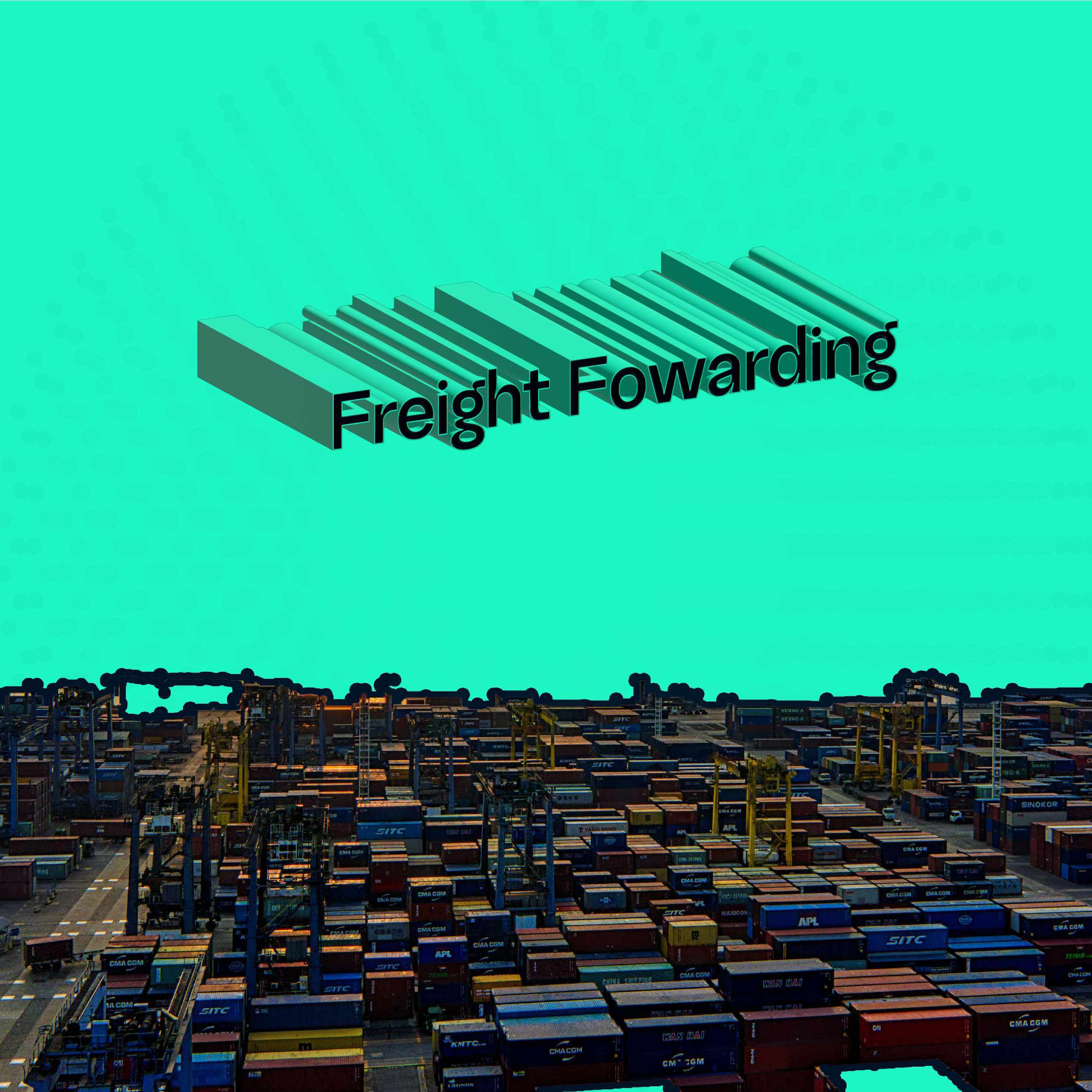What is Freight Forwarding? Everything You Need to Know
Freight forwarding means different things to different people. So today we are going to tell you everything you need to know about freight forwarding; so you can understand the services in this field that we provide. In a nutshell, Freight Forwarding is an industry of moving goods from one place to another.
There are many freight forwarder companies available today but not all of them are worth considering. If you want to know more about freight forwarding companies, this article will help you understand everything it actually involves and which company can benefit you most.
What is Freight Forwarding?
Freight Forwarding is the industry term used to describe the process of managing Global Logistics. Freight Forwarding companies manage the shipment and clearance of goods from beginning to end, from the time an order is placed by a customer until it's received. They help their clients by taking care of details such as: searching for the best prices for road, air, rail, and ocean freight, providing insurance for a package, and making sure that packages meet all export regulations and arrive at their destination on time.
Who Is a Freight Forwarder?
A freight forwarder is a company that provides the services of moving freight from one place to another. They are often referred to as exporters and importers, but their main job is to move cargo between locations in the country or around the world.
Freight forwarders can be hired by companies that need to ship products overseas or domestic customers who need their goods shipped somewhere else within their region. These businesses take care of everything from packing and shipping your product to paying for delivery costs, customs fees, and even storage if needed.
Responsibilities of a Freight Forwarder
There are several responsibilities of a freight forwarder. First, they should be able to understand the process and procedure of shipping your cargo both within and outside their country. They should also be able to help in ensuring that you get the best deal on your shipment. In addition, a freight forwarder must be able to maintain good relations with the carriers or other parties involved in the shipping of your products.
Freight Forwarders are responsible for:
Shipping documents (bill of lading) - This includes all the necessary information related to your shipment such as origin and destination address, weight and dimensions, etc.
Verifying details - In this process, it is important that you send them all the required documents so that they can properly verify them before issuing a bill of lading.
Paying bills - This is one of the most important responsibilities of a freight forwarder as they will have to provide payment for services rendered including insurance coverage among others before receiving your shipment at their location or offices.
How Does Freight Forwarding Work
The process starts with a customer placing an order for the item he or she wants to be shipped. The forwarder then searches for a shipping company that will accept the package and arranges for its delivery. The forwarder then works with both the shipper and the recipient to prepare everything needed for the shipment, including loading and unloading equipment, packing materials, and other supplies. When all of these things have been taken care of, the shipping company arranges for transportation to its preferred destination.
Freight forwarding is an important part of the supply chain for many businesses, as it provides a way to move products from one place to another. Freight forwarders take in freight from the shipper, by picking it up and then delivering it to a destination. They can also store the goods if necessary until it is picked up by an intended party.
The primary difference between the service providers may be how fast they handle customs inspections and clearance. Also, note that if you're going to ship something overseas, you'll need to have it inspected before it leaves your country and then again when it arrives at its destination. A freight forwarder will handle this process for you, making sure that your goods are cleared through customs in both countries.
The process of freight forwarding includes:
1. Sorting out which type of freight forwarder you need to use;
2. Choosing whether you will use your own equipment and crew or have them arranged by the freight forwarder;
3. Hiring an experienced freight forwarder; and
4. Mapping out your shipments ahead of time so that you know where your shipments should be sent.
Types of Freight Forwarders
The freight forwarding industry is a massive one, and there are many different types of shipments that need to be carried. Here are some of the more common types of freight forwarding:
1. Commercial Freight
Commercial freight (also known as commercial shipping) is what most people think of when they think about freight forwarding. These types of shipments are primarily made up of consumer goods sent from manufacturers to retail stores.
If you have a business that needs to ship something internationally, you're probably going to need an international freight forwarder. International shipping can be expensive and sometimes time-consuming, so finding an experienced company that can help with the process will ensure that your shipment gets where it needs to go on time and in one piece.
Commercial freighting companies usually serve as brokerage services. A brokerage service is a company that arranges the transport of goods for its clients through multiple carriers or routes. Brokers can also provide other services such as customs clearance and export services, among others.
2. Domestic Freight
Domestic freight (also known as domestic shipping) refers to the transportation of cargo from one location or country to another within the same region or country. This type of shipping is ideal for small businesses that deal with short runs or local customers because it's typically less expensive than international shipping and allows them to keep costs down while still providing their customers with great service.
These companies only offer some or all of the above services. They may not have full responsibility for loading and unloading cargo or handling the customs clearance process.
Different Means of Freight Forwarding
There are different ways that goods are moved across borders. These methods include:
Sea Freight: Sea freight refers to shipping a product by sea/ocean. It is the most common method of transporting goods because it is cheaper compared to shipping by air which is faster. However, the cost of shipping by sea depends on many factors such as distance, weight, and volume as well as the price of fuel and other supplies needed for shipping.
Air Freight: Air freight refers to sending products via plane or sometimes even helicopter for delivery purposes. Airfreight is more expensive than sea freight because it involves travel by air instead of water, which makes it faster. The cost of air freight depends on the distance traveled by air compared to the distance traveled through sea or land transportation methods like trucking or train transport methods.
Rail Freight: Railways are mostly used by large companies to move goods within a country, but they can also be used by small and medium size companies to ship products and packages. Companies rely on the speed and reliability of the railway system. The trains carry the goods at high speed, which helps them reach their destination quickly and efficiently. For this reason, they are ideal for transporting large items such as machinery or heavy cargo.
Trucking/Road Freight: Road freight refers to transporting goods by road. This is the most common form of freight transportation, as it covers a wide range of cargo types and sizes. The main advantage of road freight is its flexibility, as well as its ability to reach virtually anywhere in the country or region within days or weeks.
However, there are also disadvantages, such as increased costs and less efficient use of resources. There can also be traffic delays and breakdowns of vehicles associated with road freight.
Benefits offered by Professional Freight Forwarding Companies
The main advantage of this service is that it helps you to transport your goods quickly and with minimal hassles. The following are some of the benefits offered by professional freight forwarding companies:
Reducing Costs: Freight forwarding services help you to reduce costs associated with transporting your goods. The reason is that they take care of all the paperwork and documentation, which reduces your efforts in this regard.
Reducing Time: Freight forwarding services provide you with a great deal of time savings because they professionally handle all documentation involved in sending out your items from one place or country to another. They also handle customs clearance and other formalities for you, which results in less hassle for you.
Improving Quality: With professional freight forwarding companies, you can expect a high level of quality assurance in their services as well as in their delivery processes. They have their own trucks and drivers who follow strict guidelines about crossing borders, which ensures that shipments are not delayed or lost during transit due to delays at borders.
How to Choose a Good Freight Forwarding Company
Choosing a freight forwarder is important as you want your goods to be handled and transported in the most professional manner. A good freight forwarder will help you with all your shipping and delivery processes from start to end. They can arrange for international shipments, domestic deliveries, storage/warehousing, customs clearance, and other services that are required in the shipping process.
The first step in choosing a good freight forwarder is finding out what services they provide and how much they charge for these services. You can ask them for a sample of their guidelines documentation or ask them about their past experiences with similar shipments. A good freight forwarder should also be able to provide a free quote on their website so that you can compare their quotes with those of other companies.
It's also important to find out about any restrictions on shipping within certain countries or regions, for example, in Nigeria, there are restrictions on importing certain goods such as charcoal, frozen poultry, pork, cowries, and refined vegetable oil of any kind. Such information will surely help ensure that all your shipments go through smoothly without any delays or problems arising during transit.
Conclusion
Freight forwarding is a broad term that can mean different things depending on who you ask. Here, we've tried to provide an overview of the key elements at play in bulk shipping logistics. Whether you're a manufacturer, an exporter, or a middleman who needs to move cargo from A to B, you should have been able to find what you're looking for. Freight forwarding is a subset of logistics management whereby a third party maintains the books and records of a business. This service is typically offered by freight forwarders and customs brokers who, depending on which company you use, will process your export/import paperwork and accompanying documents. It is one of many logistical solutions offered by logistics companies.




